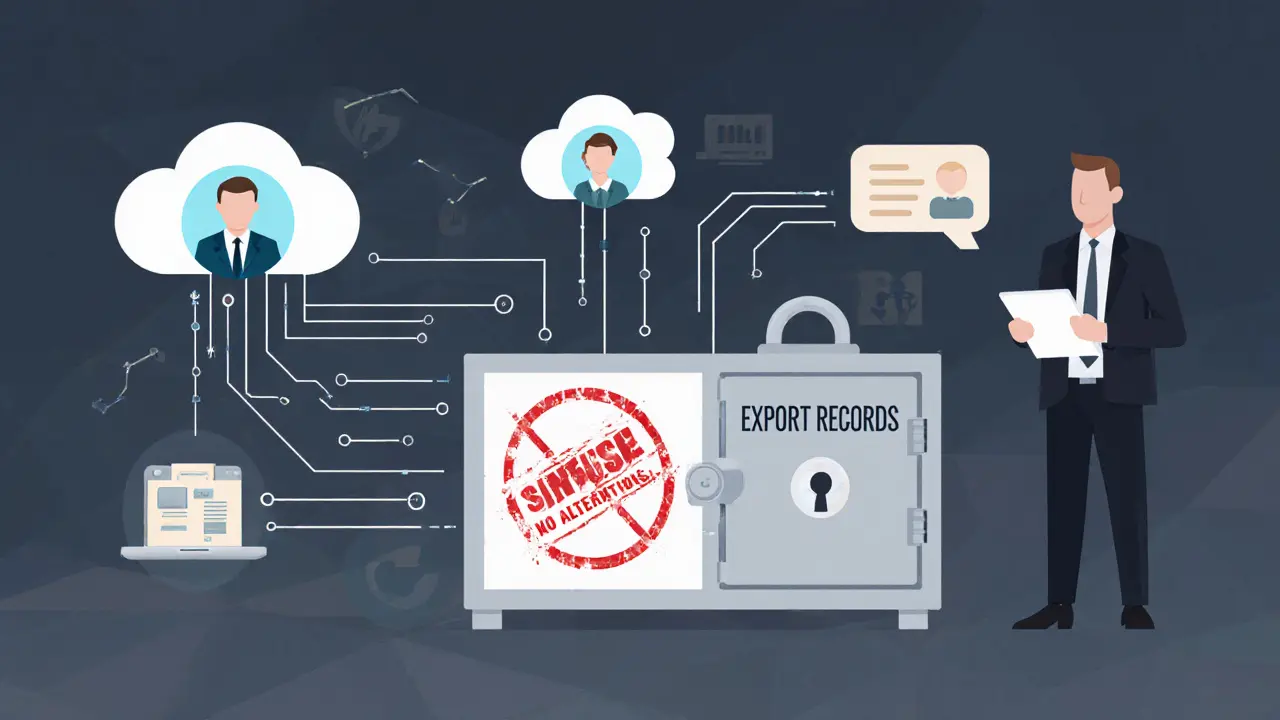Record Keeping Requirements for Businesses and Professionals in the U.S.
 Aug, 25 2025
Aug, 25 2025
Record Retention Calculator
Calculate Your Record Retention Period
Retention Period Calculator
Select your record type and business type to see retention requirements
Keeping records isn’t just about filing paperwork. In the U.S., record keeping requirements are legal obligations that can make or break your business, your license, or even your freedom. Whether you’re a small contractor, a financial advisor, a social worker, or a company exporting goods overseas, failing to keep the right records the right way can lead to fines, audits, lawsuits, or worse.
Why Record Keeping Matters More Than You Think
People often think record keeping is a boring administrative task. But it’s not. It’s your legal shield. When the IRS comes knocking, when a client sues you, when OSHA inspects your workplace, or when export regulators audit your shipments - you need proof. Not just any proof. The right proof. Stored the right way. For the right amount of time. The government doesn’t ask for records because it’s curious. It asks because it needs to verify compliance, protect consumers, ensure fair labor practices, and prevent fraud. And if you can’t produce what’s required, the burden of proof falls on you - and you lose by default.IRS: Tax Records You Can’t Afford to Lose
If you run a business or file taxes as a self-employed person, the IRS requires you to keep records that support your income and deductions. That means receipts, bank statements, invoices, mileage logs, and expense logs. Not just a shoebox of random papers. You need organized, traceable documentation. The rule? Keep them as long as you might need them to prove something on your tax return. For most people, that’s three years from the date you filed. But if you underreported income by more than 25%, the IRS can go back six years. If you never filed? There’s no time limit. Employment tax records - like payroll, W-2s, and withholding forms - must be kept for at least four years. That includes records of wages paid, taxes withheld, and deposits made. If you use a payroll service, you still own the responsibility. Don’t assume they’ll save it forever.Bureau of Industry and Security (BIS): The Hardest Record Keeping Rules
If your business exports goods, technology, or software - especially to countries under U.S. sanctions - you’re under BIS rules. These are the most complex record keeping requirements in the U.S. BIS requires you to keep records of every export transaction for five years. But it’s not just about saving invoices. You must document everything: who you sold to, what was shipped, the export classification code (ECCN), the end-use, and the destination country. And here’s the kicker: once recorded, the data cannot be altered. Any change must be logged as an amendment with a reason and timestamp. You also need written procedures that say who runs your record system, who maintains it, and how you inspect it. If BIS asks for records, you must hand them over - on-site, in person, within 10 days. No excuses. No delays. No digital loopholes. Many companies fail because they think cloud storage or email backups are enough. They’re not. BIS requires a system that tracks every access, every edit, every user. Audit trails aren’t optional. They’re mandatory.GIPS: Financial Firms Must Prove Their Performance
If you manage money - even if you’re a small advisory firm - and you claim compliance with the Global Investment Performance Standards (GIPS), you’re on the hook for detailed record keeping. GIPS requires you to keep all versions of your policies and procedures - not just the current one. That means if you changed your investment calculation method in 2020, you still need the 2019 version on file. Why? Because if a client later questions how you calculated returns in 2019, you must prove your method was consistent and documented. You also need to keep supporting documents: marketing materials, RFP responses, third-party performance reports, custodial statements, and even emails that explain your methodology. If you outsource your performance calculation to a vendor, you’re still responsible. Your contract must guarantee future access to historical data. Firms that skip this end up with clients who sue them for misleading performance claims. GIPS isn’t a marketing badge - it’s a legal contract with your clients.
Healthcare: Connecticut’s Strict Rules for Social Workers
In Connecticut, Licensed Clinical Social Workers (LCSWs) must keep client records for seven years after the last date of service. If the client dies, records must be kept for three years after death. But it’s not just dates and diagnoses. Your records must include:- Full treatment plans
- Documentation justifying your diagnosis and treatment choices
- Exact dates of every session
- Referrals made to other providers
- Actions taken by unlicensed staff (like interns or assistants)
- Every entry signed and dated by you - with your license designation "LCSW"
Employment Records: OSHA, EEOC, and the Department of Labor
Every employer, no matter how small, must keep employment records. But the rules vary by agency. - OSHA: You must log work-related injuries and illnesses on Form 300. For businesses with 10+ employees, this record must be kept for five years. The goal? Spot trends before someone gets seriously hurt. - EEOC: Payroll records, hiring documents, promotion records, and termination notices must be kept for three years. This helps prove you didn’t discriminate based on race, gender, age, or disability. - Department of Labor: Wage and hour records - like hours worked, pay rates, overtime - must be kept for three years. You don’t need a specific form, but you must be able to show exactly how much each employee earned and when. Many small business owners think, “I’m too small to be audited.” That’s false. EEOC and DOL conduct random audits. And if your records are messy or missing, you’re automatically in violation.How to Build a Record Keeping System That Works
You don’t need expensive software. But you do need structure. Start with this:- Map your requirements - List every agency that applies to your business (IRS, BIS, OSHA, etc.) and their retention rules.
- Choose a storage method - Digital is best. Use encrypted cloud storage with version control. Paper is risky and hard to audit.
- Assign responsibility - Who manages the records? Who backs them up? Who retrieves them if needed?
- Set reminders - Use calendar alerts to review records annually. Delete what’s expired. Archive what’s not.
- Train your team - Even your intern needs to know what to save and what to toss.

Samantha bambi
November 21, 2025 AT 11:35So many people treat record keeping like a chore, but it's really the quiet backbone of every professional life. I've seen contractors lose licenses over missing mileage logs, and financial advisors get sued because they didn't archive old performance reports. It's not glamorous, but it's what keeps you out of court.
My firm uses encrypted cloud storage with version control - every change is tracked, every user logged. We don't use paper anymore. Not even for client signatures. The audit trails alone have saved us twice.
And honestly? The hardest part isn't storing the files - it's training new hires to stop deleting 'old stuff' they think is irrelevant. That’s when the disasters happen.
Anthony Demarco
November 21, 2025 AT 15:55USA still the only country that makes you keep records like you're under surveillance. China doesn't care if you lost a receipt. Germany lets you say you forgot. But here? You better have a digital fingerprint on every damn invoice from 2019.
They want audit trails? Fine. But why not just trust us? We're not criminals. We're small business owners trying to survive. This isn't compliance - it's control dressed up as law.
Lynn S
November 22, 2025 AT 16:29Let me be perfectly clear: anyone who claims they 'don’t have time' to maintain proper records is either grossly negligent or dangerously unqualified to operate a business. The IRS, BIS, GIPS, OSHA - these are not suggestions. They are legal frameworks established to protect the public trust. To ignore them is not just irresponsible - it is ethically indefensible.
Furthermore, the notion that 'cloud storage is enough' reveals a fundamental misunderstanding of regulatory standards. Encryption alone does not satisfy BIS’s requirement for immutable audit trails with user attribution. And if your electronic records lack version history, you are not compliant - you are merely delusional.
There is no excuse. Not for the small business owner. Not for the LCSW. Not for the exporter. If you cannot meet these standards, you should not be in business.
Jack Richter
November 24, 2025 AT 03:52Yeah okay. I’ll keep the receipts. Whatever.
Probably won’t look at them again until the IRS emails me.
sky 168
November 25, 2025 AT 19:19Start with one thing. Just one. Pick the most risky area for your business. IRS? BIS? OSHA? Pick one. Set up a folder. Name it right. Save one year. Do it today.
Don’t wait for perfect. Just start.